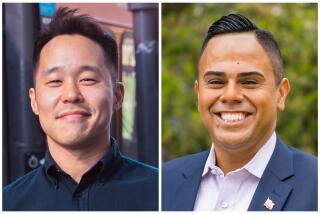Challengers for Political Office Short of Funds and Experience
- Share via
Though many are long on ambition, virtually all the challengers for state and federal office in the South Bay this year are short on experience, organization and campaign cash. For some, like Republican Rodney Guarneri, running for office only recently became a part of their plans.
Guarneri, who is competing for the state Assembly seat held by Dave Elder (D-San Pedro), says he had not considered campaigning until GOP organizers called him on Feb. 7--the first filing deadline for candidates seeking state office.
“It was 11 o’clock in the morning, and I got a call asking me if I would run,” said Guarneri, 36, a welfare case worker. “I said, ‘If you can’t find anyone else, then call me; I don’t want to do it.’ Then they said, ‘Well, guess what? You’re the last person on the list.’ ”
Despite facing long odds, some challengers could provide South Bay incumbents with spirited competition.
For instance, Democrat Marilyn Landau, a former Los Angeles Teachers Union vice president, is expected to wage a feisty battle against state Assemblyman Gerald N. Felando (R-San Pedro).
And Republican attorney David Cohen, who is part Jewish and part Samoan, is assembling a multiracial coalition he calls “Rainbow of the Right” to compete for the seat of U.S. Rep. Mel Levine (D-Santa Monica).
But this year’s crop of challengers for state and federal office has some serious shortcomings. One problem is experience: Of the 21 South Bay challengers interviewed for this story, none have been elected to public office and few have ever run a campaign.
Another trouble is money: Few of the 25 South Bay challengers who met the final campaign filing deadline appear capable of mounting the large-scale fund-raising effort needed for a successful political drive.
Campaigning with these handicaps against officeholders who on average have served more than a decade in their current posts, some challengers already appear frustrated by fighting the power of incumbency.
“Republican donors are not going to break down my door to give funds,” said Republican Eric Givens, a Los Angeles building contractor launching his third attempt to unseat Assemblywoman Gwen Moore (D-Los Angeles). Donors “work percentages,” Givens said. “Everybody wants to go with the winner.”
Though Givens says he still thinks he can organize a grass-roots campaign capable of toppling Moore, several challengers appear to be running for elective office without the remotest intention of winning.
Peace and Freedom Party candidate Alice Mae Miles, a former dry-cleaning worker living on a fixed income, indicated that her candidacy for Moore’s seat was largely the work of a party organizer.
“He came by and asked me, and I told him he could put my name down,” Miles said. Asked whether she collected the signatures needed to qualify her as a candidate, Miles said: “He got it for me.” Asked if she had any campaign issues, she answered: “No, I don’t.”
Republican Timothy Poling, the only opponent who filed to run against 23-year state Senate veteran Ralph C. Dills (D-Gardena), says his main reason for running is to get a seat on his party’s state central committee.
Both Democratic and Republican nominees, even if they are defeated in the general election, automatically win a place on their party’s state and county central committees. Poling said running a worse-than-uphill campaign can be a fast way to start a political career.
On the central committees “you rub elbows with people who know what’s going on,” he said when asked about the long odds against an upset of Dills. “And there’s always the outside chance that I could win.”
Some of this year’s challengers appear unable to devote the time and money to campaigning, even if they are determined to win.
Democrat Ed Musgrave, who is slated to face Elder June 5 in the primary, says he is a single parent living on welfare who has to take care of two sons, ages 4 and 6.
“Any place I go I have to take the kids with me,” Musgrave said. “There is a limit to how much I can subject them to.”
Concerned about undermining the efforts of their own challengers, Democrat and GOP strategists are reluctant to discuss their difficulties in finding well-known, well-financed politicians to take on entrenched South Bay incumbents.
But they acknowledge that a key problem for them is the way political district lines are drawn.
Republicans complain that, generally, districts in Los Angeles County are drawn to give Democratic candidates an advantage. In the South Bay, however, district lines do not favor only Democrats. The 42nd Congressional District straddles staunchly Republican areas, running from Torrance through the Palos Verdes Peninsula and down a narrow band of Long Beach to Huntington Beach and northwestern Orange County.
Although three Democrats have come forward to compete for the seat of 42nd District incumbent Dana Rohrabacher (R-Lomita), Democratic officials acknowledge that--if only for its configuration--the district is daunting.
“It’s really two districts bound by an umbilical cord,” said Jim Beale, a Democratic organizer in Torrance. “If you have name recognition in Torrance, you’re not going to have name recognition in Huntington Beach.”
Other problems cited include the media attention incumbents enjoy and the reluctance of local campaign contributors to be seen supporting a challenger, possibly for fear of retribution if their candidate loses.
“There are only two parties in the United States now, and they’re not Republican and Democrat,” complained Republican Sanford Kahn, who has filed to compete for the seat held by U.S. Rep. Glenn M. Anderson, (D-San Pedro) “They’re the Incumbent Party and the Challenger.”
More to Read
Get the L.A. Times Politics newsletter
Deeply reported insights into legislation, politics and policy from Sacramento, Washington and beyond. In your inbox twice per week.
You may occasionally receive promotional content from the Los Angeles Times.










